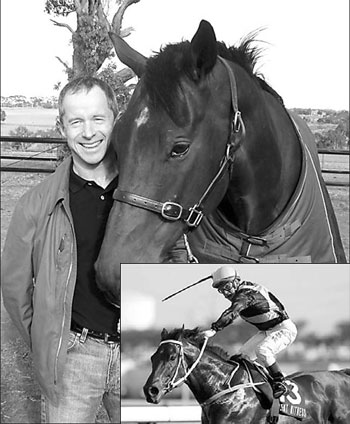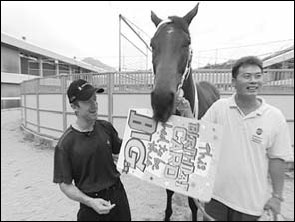Horse whisperer
In two months, Felix Coetzee, a Hong Kong-based jockey who has more than 620 wins in 15 racing seasons under his hat, will fly to Melbourne, Australia, to visit an old pal.
That friend is Silent Witness - the greatest horse in the racing history of Hong Kong.
Recalling his last visit in March, 2007, the master jockey says: "I went to the paddock and he was standing there with another horse eating grass. I have to say he wasn't really bothered.
"That's him, with his own sense of pride."
|
Above and inset: Felix Coetzee from South Africa and Silent Witness from Australia have become heroes in Hong Kong. |
Unbeaten at his first 17 starts, Silent Witness is considered even greater than the American Cigar whose 16-win streak was once considered legendary. For three years running (2003 to 2005), the Paris-based International Federation of Horseracing Authority ranked him the world's fastest sprinter. He was also voted Hong Kong Horse of the Year twice in the same period.
For all of these wins, Coetzee was the man on horseback.
In fact, neither of them is a Hong Kong native - the horse came to the island from Australia in 2002 while the man from South Africa came nearly a decade earlier. But both have turned into local heroes.
"He was very confident - much more so than me," says the jockey. "There were times when other horses had a serious chance of beating us. But the moment I sat on him, I felt reassured.
"The horse always made things easier for me."
But it was not all smooth sailing from the beginning.
"He could spot things in the far distance - and if that happened to be another horse, he would become exhilarated."
The immediate reaction was to chase and run over everything else on the track.
This streak, while invaluable to a race horse, created problems for the jockey who wanted to teach the horse how to relax and prepare him for training.
The solution: Coetzee would take Silent Witness out for exercise only late in the morning, when the track was cleared of other horses.
Over time, the horse's temperament mellowed - though not his ego.
"He was always big and proud," Coetzee says, talking of his pal who weighed at 1,300 pounds, or 590 kilos. "At the stable, he would be totally calm, walking around and projecting a big presence.
"He acted like one of the world's top athletes. The fact is he was, and he knew it."
Silent Witness would even assert his "superiority" by teasing his master.
"He would take the cap I was wearing and turn it in his mouth," the jockey says. "I would pull the cap from his mouth and put it back. And then he would take it again That's the game he loved to play all the time."
There was even one time when the horse "unloaded" Coetzee and "took off on half a second".
"When he returned, he looked down at me defiantly," says the jockey.
Another time, during a morning training session, the horse stumbled, threw Coetzee off over his neck and accidentally kicked him.
That afternoon, when Coetzee went to see him in the stable, his arm in a bandage, the horse, rather than sticking his head out of the box as he always did, looked away - maybe in guilt, probably in denial.
While they shared an intimacy, it is the moments of glory that Coetzee best remembers.
Asked about his most unforgettable experience, the jockey answers without hesitation, the Queen's Silver Jubilee Cup - not least because it was the last of Silent Witness's 17 consecutive wins. (The horse later won the Sprinters Stakes in Japan, pushing the total number of wins to 18.)
At that time, they didn't know it would be the last. But the pressure was very high because "the whole world was watching".
"The emotional build-up to the race was immense," Coetzee recalls, "because if we won it, it would obviously set a new world record."
The previous record of 16-straight wins was held jointly by the former US champions Cigar and Citation, along with the legendary Ribot.
|
Silent Witness holds his 2005 birthday card. Courtesy of Felix Coetzee |
If there's anyone who knew that everything would be okay, it was Silent Witness. Bounding out of the barrier, punching the air and galloping relentlessly to the line, he actually allowed the man on his back little time to realize that "we've done it".
At the peak of their career, in 2003 and 2004, the legend of Silent Witness had become so big that people began clinging to him emotionally, as the island reeled from the SARS Epidemic. For them, the horse embodied the indomitable spirit of the island.
However, while the jockey was modest, his equine friend had absolutely no problem with public attention. "Before the race, he would stand there all day for people to photograph him," the jockey says. "He must have enjoyed it."
When Silent Witness suffered his first defeat at the Champions Mile on May 14, 2005, Coetzee was "overwhelmed by sadness".
"I felt sad for myself, for him and his legacy," he says. "I wanted him to retire unbeaten."
But Silent Witness couldn't have been beaten. Nearly a year later on April 15, 2006, the horse, already affected by injury and illness, lifted himself up and ran to the second place in that season's Queen's Silver Jubilee Cup.
In his prime, Silent Witness always set his own pace. But by the end of his career, when the combined factors of age, weight and illness had worn down the former champion, he was willing to really put himself on the line, for someone he trusted.
"Anyone could have won on him," the jockey once conceded. But not everyone was able to ask for his best, when best meant giving it his all.
On September 21, 2005, on the morning of the same day when Silent Witness got his 18th and also his last medal in Japan, Coetzee, together with the horse's owner, trainer and other stable staff, held a birthday party for him.
"I made a big card and said to him: 'Look at this, this is for you.' Then he just took the card by his mouth and began shaking it as if he was really happy," Coetzee says. "It was so touching."
That was the only time Silent Witness showed any emotion. He remained cool at his own send-away that took place on February 25, 2007 at the Sha Tin racecourse - the venue of all but one of his triumphs.
In fact, it was Coetzee who fought back tears as he recalled the occasion. "We placed 18 color balls along the track - to mark his 18 wins.
"Then I took him out into the track and in front of the cheering crowd. All this time, the giant TV screen played the fantastic moments of his victory."
Silent Witness now stays in Melbourne's Living Legends, pasture home for retired champion thoroughbreds.
"I watched him for a long time. Without doubt, he dominated the paddock," says Coetzee of his Melbourne visit.
The jockey now regularly rides a horse from the same owner called "Chief Witness". At 41, he shows no sign of slowing down.
But will another horse eventually come to outshine the legend of Silent Witness?
"Not in my career," says Coetzee.
(China Daily 06/11/2008 page20)
















